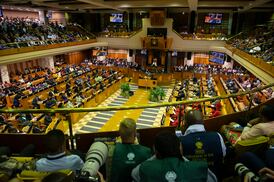Former national police commissioner Gen Khehla Sitole was this week called out in the Pretoria high court for using a nonexistent intelligence report to back out of a R580m settlement with a forensic data company.
Sitole, who was fired in 2022 by President Cyril Ramaphosa, was testifying in a civil lawsuit brought by Forensic Data Analysts (FDA) against the police for reneging on a payment deal, as well as for allegedly illegally operating the company’s firearm permit system, forensic management system and intelligence gathering system.
FDA also claims that police violated its intellectual property. The company is seeking payment of R764m — the amount it claims was independently agreed upon in a process facilitated by the National Treasury.
FDA had a long-standing contract with the police for the use of its systems. However, in November 2017, the SAPS stopped paying FDA, saying it had been instructed to do so by the standing committee on public accounts (Scopa). This led to a lengthy standoff between the FDA and the police, resulting in the company switching off the systems in April 2018.
FDA told the court that four days after switching them off, the police and the State Information Technology Agency (Sita) illegally accessed FDA’s source codes and IP to reactivate the systems.
“They changed their stance, and I guess they tried the mafia tactic,” FDA owner Keith Keating told the court in his testimony on Monday.
“This happened on a Wednesday evening, when we switched off; on the Thursday, we were informed that they were going to approach the courts. And on Friday, we learnt that they had started to access our intellectual property, and they violated our source code over the weekend. And by Sunday evening, the technicians of Sita had accessed our software and removed the date limitation and recompiled our software.”
They changed their stance, and I guess they tried the mafia tactic
— Keith Keating, FDA owner
Sitole was this week at pains to explain his reasons for withdrawing his January 31 2020 settlement letter to the FDA, in which he committed to pay R580m to avoid the company switching off the system and potentially plunging the criminal justice system into chaos.
Police said that if they were unable to use these systems, the safety of the public at large and the integrity of the criminal justice system would potentially be affected.
Sitole wrote to the FDA after prolonged discussions at the presidential guest house in Pretoria — on the sidelines of a cabinet lekgotla — where the directors of FDA were whisked in with blue lights in a last-minute attempt to avoid the sheriff of the court switching off the system.
At the lekgotla, then police minister Bheki Cele, finance minister Tito Mboweni and digital technologies minister Stella Ndabeni-Abrahams tasked various of their officials — including then Treasury director-general Dondo Mogajane and Sitole — to find an amicable solution.
“It is herewith recorded that the intellectual property on (the systems) will be bought by the State/SAPS for an amount of R460m (inclusive of VAT) with two years maintenance and support for all the systems for an amount of R120m (inclusive of VAT) (total of R580m). The aforementioned agreement to be recorded by the parties’ legal representatives and upon signature of the last party, payment will be effected as recorded in the signed agreement,” Sitole said in his letter.
However, two hours later, Sitole penned another letter withdrawing the deal: “Kindly note that the correspondence sent earlier is hereby withdrawn subject to further discussion with the minister of police”.
This week, Sitole told the court that they had decided to first agree on a price and then follow up with discussions for procurement, and confirmed that he had been told by Scopa to stop payments in 2018.
“I also received a crime intelligence report that was saying to me that the process you are busy with, the IP code, does not belong to the service provider ... the intelligence report was warning me to say they have found that FDA does not own the IP, and if I proceed, it is going to create a risk for the organisation. Intelligence reports are secret reports and therefore they get classified,” Sitole told the court.
However, FDA’s counsel, Reinard Michau, confronted Sitole with a letter from then crime intelligence head, Lt-Gen Peter Jacobs, which was sent to Sitole in June 2020, stating that there was a Daan Davis who was said to own the FDA’s IP codes. Michau said the letter was not an intelligence report but merely a repetition of a claim which had been found by courts not to be true.
“There is no mention made in that discovery affidavit of a written report. But it was the reason you ended the negotiations,” said Michau.
It also emerged that Sitole and his team had been made aware of this claim in 2018, and had been advised that the claim by Davis was not true. Sitole agreed that what he referred to as a classified intelligence report was simply the letter from Jacobs.
Mogajane also testified that the “agreements” to pay FDA were goodwill payments to keep systems operational, not agreements on the final contract price.
Mogajane stated that given that the matter was not concluded and is in court, there must have been an issue where no agreement was reached on the agreement.
He recalled suggesting that the parties go to the minister to resolve the impasse.
Sitole continues with his testimony tomorrow.





Would you like to comment on this article?
Sign up (it's quick and free) or sign in now.
Please read our Comment Policy before commenting.